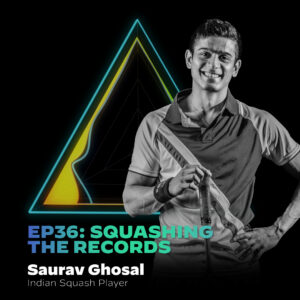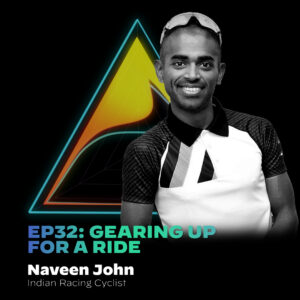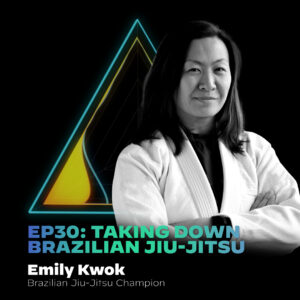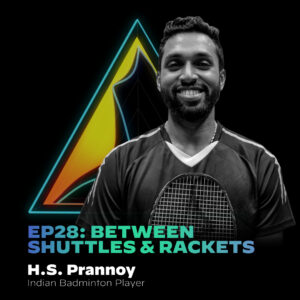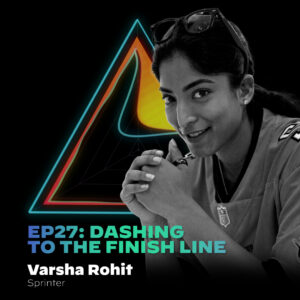Introduction Of Podcast
Becoming an international footballer growing up in India is no easy feat. India has a population of 1.45 billion, but has always struggled to compete with other countries on the international stage. In today’s episode, we are joined by Robin Singh, an Indian international footballer and striker, who outlines how it is like making it big despite the infrastructural limitations. It truly is an inspiring story and the never-say-die spirit is something we can definitely get behind. Tune in and find out Robin’s life story, struggles, success and everything in between.
Timestamps
(00:00 – 01:58) – Introduction
(03:05 – 07:49) – Robin’s Life Story In Football
(08:07- 10:27) – Robin’s Self-Conviction
(10:32 – 12:29) – Team Spirit In Youth Days
(12:52 – 17:20) – Robin On Evolution Of Nutrition
(17:21 – 19:29) – Bridging The Gap Between European and Indian Footballers
(19:40 – 24:04) – Robin On Sports Tech
(24:18 – 28:21) – Amatuer Sports Culture In India
(28:28 – 30:02) – India In FIFA World Cup
(30:10 – 31:00) – Top 3 Tips For An Aspiring Footballer
Key Takeaways – Transcripts
Intro (Mohit): India is a country predominated by cricket, having winning the World Cup on two occasions. But why exactly is football behind the curve? The fact that not a lot of people know is that India did qualify for a World Cup, but this was way back in 1950. Why the sport not pick up over the last few decades. The viewability of international and European football is increasing year and year. We are still dreaming of a FIFA World Cup qualification. So let’s understand some of these challenges and what does it take to be a pro level football player? In today’s episode, we are joined by Robin Singh, an Indian footballer, a striker who represented India and played for several Indian clubs in the I-League, and ISL and is also an Ultrahuman athlete. Robin is at his candidate best on this one as he outlines his struggles during the early years and how, despite several rejections, he eventually overcame them and represented India. We understand from Robin, what the scenario at the grassroots of Indian football exactly is. and how the Tata Football Academy gave him the chance to prove his mettle. Sports nutrition has evolved globally and Robin has seen this transition firsthand. We asked him his top three things that he wants the Indian players to have and at the early stage of their development, similar to what European footballers are largely exposed to. Similar to being a Cyborg and used the Ultrahuman M1, we ask Robin what are the top sports tech that he has been exposed to and used and benefited from. He also gives away essential tips for aspiring footballers, both mental and physical performance tips. We also ask him the million dollar question, when would India be seen in a FIFA World Cup? So let’s dive right into it.
(Mohit): Hey, Robin, great to have you here. Such a pleasure to get you on the podcast. I think for the longest time, I think we have been thinking about getting on the podcast and talking about such basically the sport that we’re all big fans of, of course, but obviously there’s a lot of potential and a lot of scope for India to prove in the world. But I think we’d love to talk more. And first of all, thanks for being here.
(Robin): Thank you, firstly for having me. It’s a pleasure to speak to you and everyone listening as well. Football is a great sport for everyone listening. I love the sport and I hope we can inch you closer to becoming footballing fans by the end of this.
Question (Mohit): Absolutely. And I think that’s definitely a great aim from the podcast. And since you mentioned this, I would love to start with the point that it’s such a great sport, right? I mean, probably the greatest sport out there and it’s such widely followed globally. But when it comes to India, I think there is still a lot of ground to cover, right? So what would be yours? What was your story around getting inspired by the sport nationally, becoming a professional footballer, then.
Answer (Robin): For me, I think it’s just the adrenaline rush and the excitement and the ways to express that football gives you that made me fall in love with the sport, that lets me keep loving the sport, even till today. Just like a lot of us out there, I used to play cricket. I used to play cricket, wanting to turn into a professional, and then all of a sudden, when was this? I think I would say 14-15, I would suggest, and when it rains, you really can’t play cricket. So I was speaking to my friends and they were going to play football and me always has been like an outdoor kid, so they said, we’re going to play football, would you like to join us? And I did. And luckily for me, there was a coach that was there and he asked me, would you like to train in the academy for a while? And we’re going to play a tournament in Chandigarh, would you also like to come along and play for us? I didn’t even have to think of it. I just said yes, I’m coming. Took that information to my parents and said, Mum, Dad, I’ve been asked by a coach if I would like to play football and that would take me to play a tournament in Chandigarh. And yes. And my parents said that, it’s up to you, Robin, we support you in whatever you want to do, but you got to make a choice. Would you like to move forward as a cricketer, as a footballer? Again, I think I said footballer quicker than I told the coach that I’d like to go to Chandigarh. And since then it’s been a journey. I went to Chandigarh, we played the tournament. There was St Stephen’s School, Chandigar, that was also in the tournament. And the coach of their school asked me, would you like to join our school on a scholarship and we’ll train you and take you forward? So, yeah, again I said, yes. Again. I said yes. I would love to. And I took that information to my parents and my parents have been supportive and said, yes, if you’d like to play, you can go play. We are here to support you in your dreams and aspirations and that was it. And year and a half or two years after being at St Stephen’s, Chandigarh, I was asked by the Chandigarh State team would I like to join them and train with them and move forward and hopefully become a professional. And I did. Wow. And that’s where the first rejection came in as well, when Chandigarh Football Academy said, I’ll never become a footballer.
Question (Mohit): What was that? Tell us a little bit about that.
Answer (Robin): Yeah, I took that information and I said, I appreciate your opinion, but it’s an opinion, it does not define me. So I packed my bag from Chandigarh, took that rejection. Obviously, I was sad. You never want to hear somebody telling you that you’ll never be able to achieve your dreams or something that you love. So I packed my bags, I went home to my parents, and we spoke about what’s the next option, and Tata Football Academy was the option. And I got on a train with just a backpack, and I just went to the coaches at Tata Football Academy and requested them to please see me play. And if I am good enough, they can decide what they want to do. If I’m not good enough, at least I know what to do ahead. But believe me, I wasn’t going there just to be not good enough. I went there with just a backpack and a one way ticket to find out how hungry I am to be what I want to be for the sport that I love. And luckily for me, they thought, I can play football, and I joined them for four years, played probably everything possible. Every tournament for Tata Football Academy. Had the honor of captaining the Jharkhand side as well in state nationals that came to Haryana as well.
(Mohit): No, this is like straight out of a movie.
(Robin): I don’t know what a movie, man, but it still moves me till today. It’s something that I think of, and it makes me push myself harder. Everything. Because you don’t like to be told you’re not good enough for something, and especially me, if I’m not, I will push harder, but I’ll never take no for an answer. And that’s how I built in my life. If there’s something missing, I will work and work and work and work and work, and I’ll keep working every day.
Question (Mohit): That’s so inspirational, man. And what’s really cool is that you actually took energy from an answer which was negative. Let’s say somebody told you that you can’t do something, and you channeled it into becoming exactly what you wanted to become. And what was your thought process? What was the self like? What led to that self-conviction? Like, sometimes people believe in themselves because they just know that they have the skill, Sometimes people know that they have the fighting spirit. But what was it in your case? What made you believe that, okay, I will fight, and I will get there?
Answer (Robin): I’ve never given that a thought, to be honest. But I think I love the sport too much not to be able to play it. And if I’ve decided to play it professionally, there is no plan B for me. If I’ve dedicated myself to doing this, I don’t have a plan A. There is no what if football doesn’t work. Football will work, because I will give it everything I have till my leg last to achieve my dreams. And every day, I just dream of being the best version of myself. So every day, the work will go in, and I think the rejection just fuelled that. I think when someone says no, as you said, there are two ways of looking at it. Either you accept it or you don’t. And I think that, no, you’ll never become a footballer just pushed me to being able to play professional football. I think I joined East Bengal in 2012 from Tata Football Academy, which is one of the best teams in India. And I think that was also turning point, saying, okay, you know what? I’ve made it here. Now I got to go again. Now I will go again. I think that’s what it is. For me, there is no plan B. I am what I am because of what football’s given me, and that’s what it is. I love playing football. I love to play football, and it’s the best feeling ever, and I don’t want to let that feeling die.
Question (Mohit): The love for the sport is quite visible, of course. I think probably this is highly underrated factor when actually people think about what they want to do in life. Often it’s about the capability or how mentally tough they are. But I think the love for the sport and love for what they’re doing, that’s why I said it seems like it’s straight out of a movie where it’s such an exciting plot. I think if you look at the like, I would imagine the team back then to be in India, at the Tata Academy, to be like an underdog team. Because even if they are experts in the sport and they love the sport, they would be against not really against, but sort of like, from a limelight perspective, there’s to be massive, right? Essentially. So how is the team spirit?
Answer (Robin): So Tata Football Academy has always been a team that has a great team bonding, great team spirit, because when you enter Tata Football Academy, you spend four years together doing everything from training to studying to analyzing games. Everything and anything that has to be done for football, you get to do for four years. Two years as a junior player, if I may say, and two years as a senior player. So you specifically train your skill set for two years. And a couple of us are allowed to join the seniors while they play the next tournament or whatever the coming tournaments are. And the seniors, who obviously been there for, let’s say, two years, more than us, get to play the tournaments across, cause Tata Football Academy is like a fishing ground for all the clubs in the country. So you’re looking at boys that are anywhere between 17 to 20 or 17 to 21, which is your peak and prime to making it to professional football. You’re at Tata Football Academy competing against the best of the best. So the camaraderie, the team bonding, the team spirit, it’s really high amongst all of us, and specifically also the competition, because as much as your teammates, you’re also looking to make it into Indian football. So you always have to be playing to be the best, and I think that pushes you a lot. And as I said before, God blessedly, I played well, we played well, and because we played well, a lot of us got our first professional contracts from great clubs like East Bengal for me.
Question (Mohit): Very cool. All of these things actually seem very I think in terms of the sequencing, seems like the history in making. Right? So when the next ten years, of course, this is going to become massive. And when you talk about it, I think this is going to look like almost like, as I said earlier, right? It’s an amazing, exciting plot. I’m going to switch gears a little. Back then and now when it comes to focus on nutrition and fitness, what evolution have you seen in this space? And maybe let’s start with nutrition, to be simple.
Answer (Robin): A lot. If I can give you an example from eating perspective, you are eating food, but you are eating food to get energy or just like get a meal in you. Now you eat a food to fuel you as a professional athlete. Now it’s more about fueling yourself with right nutrition, right dietary supplements, what your body needs to help you sleep better, recover better, perform better. I know all these things because we as athletes have grown over the years from, let’s say, 2010 – 2012. Right now you know exactly what you need to be hydrated. You know exactly what you need to, let’s say, bulk up exactly what you need to be on a high protein diet and shred some muscle or weight that you need to shred. So all this information has definitely progressed in India. Before, you were working hard and you were eating. So you’re ready for the next training session or next game, right? So there’s definitely, definitely been improvement in terms of nutrition as well.
And honestly, people like all companies like Ultrahuman have come in and they’ve also changed the game for someone like me who loves numbers and loves to know, yes, okay, I’m an athlete. I know, let’s say just the outer ideas of what I should be eating as an athlete, right? But what you eat and what I eat could be fuelling my body completely differently, or how much ever you eat and how much I eat could be completely different to what our body needs. And I think that’s the scope that we’ve improved on. We have devices, we have people, we have companies, we have sources of information that are specifically tailor-made for you, and Ultrahuman is one of them. So that’s the growth in nutrition, for sure, that’s really cool.
(Mohit): We have such an interesting time in the history of the evolution of nutrition science that in very, very early science, we actually started to understand that even though we are one species, we’re not essentially one in terms of how we metabolize food and how we interact with our environment like just as we mentioned, right? The same individual, yeah, the same set of individual would actually react differently to food, workout, sleep, stress based on the environment. And because it’s lifestyle, it actually compounds much faster. Essentially, it’s not just that 1 hour in the gym, it’s happening every minute of your life. So I think this is definitely going to take Indian sports to another level as we work together towards adding more layers of sports science, making data more available. Because you can say that of course the core of the engine is obviously the athlete, but then everything the last inch actually matters. That 1%.
(Robin): I completely agree with you because when people ask me the same question about what is different from European footballers and Indian footballers and the only thing that we can ever say that we with all due respect, lack, is physicality. And how do you become a lot more physical? It’s with the nutrients that you have, at least even if you go to the gym, you need energy to go to the gym, right? If you want to build muscle, you need a specific nutrient to build muscle, right? So it does come down to food. Another aspect is for me specifically, I think mental toughness. I think being mentally strong and every day saying I will be my best in front of anybody, whoever is my competition, I will take it head on, is very important as well. So as long as as you said, we’ve progressed so much on the fronts of sports science and nutrition is just one leaflet of that science book. There’s so much more. There’s scientific trading methods now, there’s mental conditioning now, there’s nutrition now, and so much more, so much more that our country has grown as a footballing nation as well.
Question (Mohit): What would be the top, maybe the top three things that you would want to see just to bridge the gap between, let’s say, European footballers have access to and what we have access to. And I’m asking this purely for my information as well because what we also want to do is bring all the performance systems, obviously to evolve them as well. What would be some systems that, let’s say, a sports science company like ours should invest in and bring to Indian athletes?
Answer (Robin): I think infrastructure, if I can put it together, is infrastructure because we’ve taken, let’s say, our steps towards nutrition. Again, you know, Ultrahuman are helping not just athletes, but people like anybody who wants to have, let’s say, a sporting or a healthy lifestyle, you have access to what is going inside your body. And as athletes, we have that access as well, right? So now, not just as athletes, as people as well, we have more knowledge of what our body needs. And I say this as a sporting nation, we need to grow. Athletes will grow. But as a sporting nation we need to grow. So I would say infrastructure, nutrition, and again, just building on yourself, build on what you think is lacking. Because if you say access, we have access to everything. The Internet is a large array of things or large window to the world. We’ve got to use it the right way. And for me, I think that’s just there. I have been able and I’ve been blessed enough to have access to great infrastructure, great people like Ultrahuman who also got me introduced to people that helped me with mental toughness. Because I think as athletes, we think we’re strong and a lot of people can say anything and everything to us and we’ll just keep doing it. But you got to understand, none of us go onto that pitch to play 50%. And we are humans that will make mistakes. And sometimes people behind the keyboard say things that are hurtful, but we as athletes and humans do get hurt. But it’s just about making sure that I believe or we believe in the right people that support us and keep pushing through.
Question (Mohit): You have the mental toughness. I think that’s the advantage that you have because of you being an athlete and also the journey towards becoming an athlete. Yes. Another trend that I think we have noticed is that athletes have started playing for longer. Generally. The average age of athlete has moved from what we know is around 37 years to 43 years now globally, like Roger Federer and Djokovic for like playing and performing throughout to the end of their career, right? And of course, there are numerous such examples in every other sport as well. So with that happening and athletes also investing in alternative methods. So what I know, for example, is that Djokovic, for example, goes for cryotherapy, ice baths. Combination of these two hot cold alternate, I think maybe in the form of a Wim HOF method. Some of the athletes I know also do, let’s say, hyperbaric oxygen therapy. Many of the athletes have started getting into their own genetics to understand their predisposition to disease as well as nutrition issues. What are some of the things that you saw, these bleeding edge technologies that you’re excited about? And that’s something that you think would be very valuable?
Answer (Robin): I think one thing that I love is cryotherapy. I think each body, what you call reacts differently. My body loves cryotherapy. If I get a nice path every day after training, I’m ready the next day. But then again, the advances in sports science, these are just like the crux of it. And the athletes that you speak of and the athletes in football as well. You got Ronaldo at 37, you got Zlatan at 40. So you’ve got these athletes that are performing day in and day out at their best. It’s just because they’re paying a lot more attention to how they recover. Football is a very demanding sport, and your recovery comes down to sports science of your physiotherapy, your recovery sessions, your nutrition, eating the right food at the right time, giving your body the right nutrition before games, after games, the small windows that you need to be fuelling, the small naps that you need to be taking. So there’s so much more, there’s so much advances around the world. And as I said, we have access. We need to be looking at the right things that are meant for us. We can do anything and everything on the Internet. It’s what you choose to do with the Internet. Do you wish to learn from it or you just want to see what’s around? So at the end of the day, it’s what you make use of it. And coming back to, what am I excited about? 100%. My body loves the ice, and it’s protected me from injuries, it’s healed my injuries, it got me ready for the next day. And side by side, my physiotherapist again, my mental conditioning coaches, my nutritionist. It’s just been so much more helpful to elongate my career. And as you said, 37 and 40 is the new age that people are performing at. And I can’t wait to be 37 in that case.
Question (Mohit): Yeah, absolutely. I think in the future, of course, a lot of we foresee that this 43 will also move to 50 or cross 50, right? Essentially, people will live longer, perform for longer, and lead a much happier, fulfilling life. And that’s precisely what we feel is the goal of our longevity platforms. There’s a lot of controversy around that. Oh, why do you want to make people live longer? So the answer really is that we feel that it’s not just about the number of years, but also the quality of life. And if we have this one life, potentially should have the chance to actually live this the way we want, do things we want, and have access to things that improve or enhance the quality of life. That’s what we’re doing with, like, if somebody buys a car today, they have the ability to upgrade a car, right? They can pay money and upgrade a car. They can pay money and buy the best car possible. But you can’t upgrade it’s very hard to upgrade your body just by paying money. It’s very hard to change your body and buy a new body right now. It’s impossible. Things like to change your body and sort of like, get a new body and some of these things. Why shouldn’t that be possible? Why shouldn’t you be able to have a better quality of life? That’s what we believe deeply in as we build this in collaboration with athletes, obviously, for millions and millions of people who actually want to live better. I think there’s a very strong angle to you can say that there is semi-pro or amateur sporting culture that will also lead to improvement in pro sports eventually in the future, right? What’s your view on that? Like, how do you see the culture evolving in India around amateur sports, because that’s usually when you study sporting economies and transporting cultures across. They have very strong amateur sports culture.
Answer (Robin): I think, as I said, we have to grow towards being a sporting nation from a footballing perspective. People say, when will we play the World Cup? It’s when we are working towards being a footballing nation, when we are the best in Asia, we’ll be the best in the world, or we’ll play against the best in the world. Again, that does not strive, or that does not all of a sudden grow from eleven athletes or eleven teams or one 10 coaches. It’s a nation and 1.3 billion people. I think we have the power to achieve anything we work towards achieving, but it has to start at the bottom. And for that, as you said, your pro-ams and your amateurs, we’re all growing. When I was younger, I remember coming from Noida all the way to I think it was Chhatarpur at that time, which is, let’s say, a two hour journey to play 20 minutes of football. And now there are fields in a lot of corners of not just Noida across Delhi, across Goa, where I currently live. And wherever I see a lot of people are kicking the ball around as much as the cricket is happening, there’s football happening everywhere. There’s a small sided pitch. If not a pitch, you’ve got a square that’s got two shoes as a goal post. That’s what takes you towards being a professional. When you hear stories of professional athletes, it’s not just that they were training on a full 11 v 11 pitch, from the beginning of their lives, or from the time they can remember. All of us athletes have played gully football. I remember playing football where if I kick a ball at a garage door, there used to be an auntie that would chase me to whack me. But that was my first agility session trying to get away from her. It all begins the same way. It all begins with the desire to grow, the desire to play, and the love for the sport. And I’ve seen the love of football also competes with a cricketing nation, if I may say. A lot of people play football now because it’s a wonderful sport. It lets you express so much. And I can talk about football all night long. I love the sport so much. It gives me so much excitement to just watch people play. I just came back from a trip and I was walking somewhere and I heard someone kick a ball. I had to deviate. I had to turn around and see who’s kicking a ball. And I saw just boys play football. And it was so much happiness just standing there and watching these people play. Watching football gives me happiness. So think about what people who play football do. So much fun, so much love.
(Mohit): What’s really cool is that it’s both cultural and minimal, right? You just basically need you see nothing. That’s why you can see that across the world. The reason why it’s one of the most preferred sport culturally is also because you don’t need to be a rich nation to actually start playing football.
(Robin): Not at all. I’ve played football from a bottle cap to a full sized football. You just need something to kick around and I know so many people listening as well. They would have kicked a stone on the road. So that’s your first football kick. Now just find another football and just kick it around. You’ll love it. Slowly you love it. And again, anytime anyone who’s listening, Mohit, including yourself, anytime you want to watch a game, I would love to take you to watch a game.
Question (Mohit): I’ll take that. I’ll take an offer. I will be there. Very nice. It id so cool. I’m super motivated to right now work out first and then of course to figure out something to kick. But this is super cool. Also ask you what you just mentioned along the way and of course a lot of listeners want to hear this. What’s your estimate of India being featured in the World Cup? I think we’re still on the path. As I mentioned before, to be the best and play against the best, you’ve got to be the best way you are. So since we’re in Asia, we got to be playing against the best in Asia, which are the likes of Australia, Iran, Qatar, who have done a great job with their setup as well, infrastructure wise, to reach towards the World Cup, we have to be playing against the best in Asia at a consistent level so that we grow as a nation. We’ve done really well in the Asian Cup qualifiers. Now we just want to move forward and put our best foot forward at the Asian Cup and from there on forth, we’re on the way to the World Cup. The aim is always there. It’s about collectively working towards the aim. And when I say collectively, I just don’t mean the footballing fraternity or the footballing federation. I mean us as a nation, people who support us, people who want us to be there. We all should be together working towards our aim as a nation. And everything matters from nutrition to infrastructure to fans to players. We all should be at the same and we’re at it. So it’s going to grow. Even the likes of the Indian Super League who helped us to get towards that. We’re all together in it. I don’t see it being too far, but we got to work towards it because you’re playing against the best in the world. It’s never going to be easy.
(Mohit): I love the focus, being the best in Asia. I think everything has to be a step by step.
(Robin): You don’t jump steps, you jump steps, you fall.
Question (Mohit): Yeah, that’s actually applicable to everything else in life as well. So. On that note, I think this is a very popular question. I think a lot of people want to understand what would be your top three tips to an aspiring footballer?
Answer (Robin): I would say believe in yourself. I think that’s number one, belief. Even on days when people say no, you make sure you believe in yourself and dream big. Dream. If you think that dreams unachievable, chase it. Chase it. Nothing is unachievable if you chase it. I think the last is just focus on the right foods. Nutrition is very important. I think we focus on nutrition. We believe in ourselves and make sure that the hard work is there and everything is achievable. I think that’s definitely how I function in life and in sport. I believe in what I do. I dream big always, and I make sure that I fuel myself the right way to achieve my dreams.
(Mohit): Robin, it’s just been extremely insightful and inspiring at the same time. Super glad that we could connect and chat on this and really glad to have you as a guest on the podcast. Of course, we have a long collaboration to work on and definitely would love to cross paths again, thanks to for making it here, and I look forward to seeing you soon.
(Robin): Thank you more. Thank you for having me. Also, everybody listening. Thank you for giving us your time. Again, I say it again, if you want to watch football, please find me. I’ll take you to a game.
(Mohit): Very cool. Super excited. Thank you, Robin. Thanks Mohit. Robin’s story is very, very inspiring.
Outro (Mohit): His self conviction and his love for the game is something which drove him to make his dreams come true. His mental toughness, his passion for the game is something to definitely get inspired and motivated by. Share with us your top moments of seeing Robin play football. Tag us on Twitter and Instagram @UltrahimanHQ. We have more such guests and personalities upcoming on the Ultrahuman Podcast. Press the subscribe button on Spotify and Apple Podcasts and stay updated. I’ll see you soon with next one.




